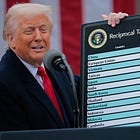100 Days of Ressentiment
Donald Trump’s disregard for law—and thirst for revenge—mean worse is to come.
If you enjoy this piece, please give it a like! If you know someone else who would enjoy it, send it their way!

On the occasion of the Trump administration’s first 100 days, there has been a welter of articles detailing the range of truly awful policies he has sought to enact. These policies range from impossibly large and unpredictable tariffs, to undercutting support for Ukraine, to illegally firing thousands of federal employees and closing entire agencies, to claiming Greenland and Canada, to snatching people with legal rights off the streets and deporting them to foreign prisons, to attacking universities and academic research institutions with a meat cleaver. The single thread running through these actions is Trump’s total disregard for law and norms: to an even greater extent than other populist-nationalist leaders like Viktor Orbán or Narendra Modi, he has deliberately acted with breathtaking speed and thoroughness. He is an authoritarian hoping to turn the United States into an authoritarian country.
Rather than cataloguing this list of abuses, it may be more useful to consider what motives lie behind them. Since the early days of the first Trump term, a minor industry has grown up trying to put his thoughts and actions into something like a coherent intellectual framework: he is a nationalist, a populist, an isolationist, an imperialist, a postliberal, a nativist, and so on. I think most of these characterizations are inadequate because he has been several contradictory things simultaneously: for example, he both eschews “forever wars” and yet wants to expand the land area of the United States, or reduce prices while raising taxes and stoking inflation. Least convincing of all are ponderous books like Patrick Deneen’s Why Liberalism Failed or Regime Change which try to put Trumpism into a coherent philosophical framework.
Ever since Trump’s first term, I’ve felt that the phenomenon he represents could best be explained not in terms of ideas or ideology, nor could it be easily explained as a matter of economic interest, social groups, class, or other familiar concepts. It is not that such factors are irrelevant, but rather that they fail to capture the full phenomenon. The most useful framework in my opinion is psychology, both personal and social. Trumpism is basically a mentality drenched in what Nietzsche labeled ressentiment, that is, acute resentment of others based on wounded pride, perceived disregard, fears of inadequacy, and a desire to exact revenge on those who had earlier failed to pay adequate respect.
What needs to be explained is not the major thrusts of Trump’s policies on immigration, foreign affairs, or trade, since these were well-advertised in advance. What is truly mysterious are the myriad of smaller decisions made by his administration. Why seek revenge not just against major figures like the Biden family or Special Prosecutor Jack Smith, but also the countless unknown lawyers in major law firms who had been hired by Smith? Why pick manifestly incompetent and unqualified people like Kash Patel or his deputy Dan Bongino to head the FBI, other than Trump’s desire to target a very long list of people whom he believes have wronged him? Why would anyone in the new Washington seek to end New York City’s congestion pricing, contradicting Republican nostrums about federalism?
That Trump suffered from disrespect is well known: he was a brash, uncultured parvenue from Queens who was never taken seriously by New York’s leading cultural leaders or institutions. He could make the front page of the Enquirer but not The New York Times. Perhaps the height of disregard took place at the 2011 White House Correspondents dinner at which Obama mocked him to his face. He burned with hatred of the entire liberal establishment, and understood perfectly the shared resentment of the many non-elite people attending his casinos, whom that same establishment has scorned. That, rather than any coherent ideology, is what the MAGA movement is built around.
Shared resentment also explains his current Russia policy and his strange love of and admiration for Vladimir Putin. As detailed by Maggie Haberman and other journalists, Trump was terrified early on in his presidency by the charges of Russian collusion in the 2016 election, charges that culminated in the Mueller investigation. Since then, Trump has repeatedly attacked the “Russia hoax” as an example of the ends to which the establishment would go to try to discredit him. In the years since then, he has built a cult of victimization around the “Russia hoax” that builds on the disrespect felt by his MAGA followers. Earlier this year he made the strange statement that both he and Putin suffered in similar ways during the first impeachment hearings. I doubt that Putin felt nearly as vulnerable as Trump at that moment, but Trump was right in seeing the Russian president as a figure who also burned with resentment, resentment for superpower status lost after the breakup of the USSR that was exemplified by Obama’s reference to Russia as a mere “regional power.”
In the leadup to the 2024 election, I was continually annoyed by some of my more centrist Republican friends who argued that Trump really wasn’t that bad and that his first term had shown he could govern like a normal Republican. In several pieces written before the election, I argued that a second Trump term would be much worse, since he had spent the interregnum building a cadre of followers whose primary qualification was personal loyalty. But the second term has turned out to be much more extreme than even I had expected last year, not just in the radicalness with which he has pursued pre-announced policies on immigration and trade, but also in the detail and thoroughness of his revenge agenda. He has shown himself willing to use any extortionate means available to go after people with only the most remote connections to wrongs he suffered, including individual scientists and lawyers and business leaders.
Trump is far more self-confident and unwilling to take advice this time around. Since last November, he has repeatedly asserted that he won an overwhelming mandate in the election. That he did win decisively is beyond doubt, sweeping all of the swing states that pollsters believed were up for grabs until the day of the election. But an overwhelming mandate it is not: unlike FDR’s Congressional supermajority in the 1932 election, the Republicans have the slenderest of majorities in the House, and Trump himself, while winning a plurality, failed to win a majority of the popular vote. Nonetheless, his unexpectedly good showing has obviously convinced him that he has an unassailable mandate to do whatever he wants. This includes not just policies he has long promised to deliver, but acts of personal enrichment like starting meme coins for himself and his wife while lifting Biden administration constraints on cryptocurrencies.
Across several of my books, I’ve repeatedly written about the importance of thymos—the Greek word for “spiritedness,” or the desire for recognition—and its importance for politics. In The End of History and the Last Man, I even talked about Donald Trump, who in 1992 appeared to be nothing but a rich businessman. I argued that in the American capitalist system, one could fulfill one’s desire for superior recognition over others by getting rich in socially harmless ways.
What I failed to see back then was how this particular individual’s thymos would drive him to seek not just wealth but the systematic destruction of the very institutions that constituted American democracy.
Francis Fukuyama is the Olivier Nomellini Senior Fellow at Stanford University. His latest book is Liberalism and Its Discontents. He is also the author of the “Frankly Fukuyama” column, carried forward from American Purpose, at Persuasion.
Follow Persuasion on X, LinkedIn, and YouTube to keep up with our latest articles, podcasts, and events, as well as updates from excellent writers across our network.
And, to receive pieces like this in your inbox and support our work, subscribe below:







I have to say that I’m amazed that anyone could be surprised by Trump 2.0. While I didn’t see Musk coming - not sure how anyone would have, the outlines of every other aspect of his return to the Oval Office were entirely predicable, falling into six major categories.
FIrst, of course was in itself twofold. To take all the revenge he could on anyone at any level who had any part in the ‘lawfare’ against him for his attempts to overturn the election of 2020. And at the same time to do every thing he could to neutralize or eliminate any organization that might be able to oppose or hold him to account for any illegal or unConstitutional act he attempted, specifically his pursuit of personal wealth and power; his goal being the same as that of Louis XIV to be able to claim “Etat, c’est moi!"
Second - To surround himself with sycophantic Cabinet members and any other govenmental department heads who would work tirelessly to implement any policy he chose without question or opposition, and who would make sure their departments did the same. Nor did he want people of real competence in those positions who might challenge ‘the smartest guy in the room’
Third - to continue his policy of detachment from NATO or any other allies both to minimize their influence on him and to reduce any responsibility we might have to aid them.
Fourth - to win the Nobel Peace prize he felt had unjustly eluded him during his first term (remember Nixon’s statement that the greatest name. a president could achieve would are that of peacemaker). That, of course meant ending the Ukraine war, regardless of the consequences to the Ukrainians.
Fifth - to enable him to continue to enjoy all the perks of office and to appear at Presidential rallies in which total approbation and adoration would be the theme.
Sixth - to continue to be able to excoriate ‘the elite’ (ie those who had always spurned his social aspirations).
Everything he’s done since his second inauguration has been in pursuit of those goals, and was entirely predictable.
I have to say that it is refreshing beyond belief to see someone like Nietzsche quoted in a social media post. DT has unleashed forces in the collective psyche of his followers that are truly Nietzschean in the sense of erupting from the dark recesses of the soul. I like the word ressentiment, but even it does not capture the full chaotic nature of what his actions represent. How about messentiment?